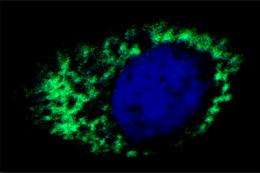Discovery may lead to mitochndria syndrome treatment

Mitochondrial depletion syndrome accounts for about 11 percent of the cases of children born with common myopathies and a more mild form of the syndrome affecting adults. A new finding by Cornell researchers may lead to a nutrition-based treatment with B vitamins.
The syndrome can cause developmental delay, muscle weakness and myopathy (a muscular disease in which muscle fibers lose function) and can be fatal in children; it can generate exercise intolerance, fatigue, anemia and neuropathy (disorders due to damaged nerves of the parts of the nervous system outside the brain and spinal cord) in adults.
Mitochondria are known for supplying cells with energy, along with many cellular functions ranging from cell growth and signaling to cell death. Though the syndrome is commonly associated with genetic mutations, the details have been largely unknown.
Now, Cornell researchers have identified a new human gene, called DHFRL1, and an associated pathway that is required for faithful replication and stability of mitochondrial DNA, according to the study, which was published Aug. 26 in the Proceedings of the National Academy of Sciences.
"We have found a new pathway, which when disrupted, may explain mitochondrial depletion syndrome in a subset of adults and children," said Patrick Stover, professor and director in the Division of Nutritional Sciences and the senior author of the study. Donald Anderson, a former graduate student in Stover's lab and now a postdoctoral associate at the University of Texas Southwestern, is the paper's lead author.
The study describes a pathway in which the DHFRL1 gene and two other genes, SHMT2 and TYMS, express proteins that lead to the synthesis of dTMP, a nucleotide that serves as a building block of mitochondrial DNA. The pathway is needed for faithful replication of mitochondrial DNA and leads to genomic stability.
When Stover and colleagues knocked out the DHFRL1 gene, the pathway was disrupted, leading to mitochondrial DNA instability, which is the hallmark of the depletion syndrome.
The vitamin folate (naturally occurring B-9, also known as folic acid, in its synthetic form) is essential to the pathway's proper functioning.
In the United States, food is fortified with folic acid, but for individuals who have genetic mutations that lead to folate deficiency or an inability to use folate properly, vitamin B-9 supplementation could improve their health, Stover said.
"Pathologies related to B vitamin folate are common in the United States and worldwide, and this study sheds new light on the role of folate and B vitamins in the body and has implications for treating mitochondrial depletion syndrome," said Stover.















